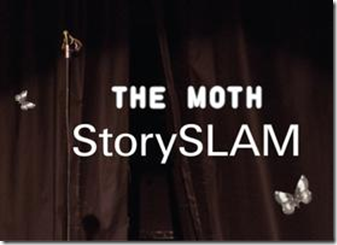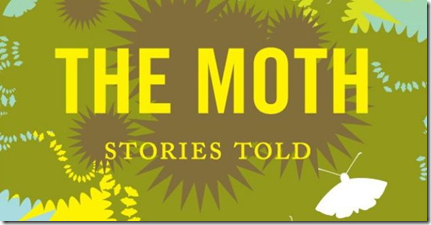On Monday some friends and I attended a Moth StorySLAM at the Bitter End in New York. After winning six StorySLAMs in a row, my luck finally ran out. I was chosen to tell my story first and finished in third place.

Still, I told a good story about the time I moved my childhood bedroom from the second floor of our home to the basement without my parents knowledge, and anytime I am able to take the stage and tell a story, I am pleased.
An odd thing happened when telling my story:
At the end of my story, when my initially amusing story was supposed to take a sad turn, the audience continued to laugh. As I described how my parents took three days to realize that I had moved to the basement, and what this meant to me in terms of the amount of parental attention that I was receiving, the audience continued to laugh out loud.
It was strange.
This may have been the result of going first. Maybe the audience, which was comprised of many first time Moth attendees (it was a holiday week), didn’t know what to expect.
Or perhaps my story was so sad that it was funny.
Or maybe my delivery was simply off.
Audience members later told me how touching my story was, and a couple admitted to getting misty-eyed near the end, but the great majority thought the whole thing was hilarious.
Whatever the reason, it’s more than a little weird getting a little choked up on stage while the audience continues to laugh at you.
Going first always stinks.
I suggested later on to a friend that I might be willing to give up my right pinkie finger to avoid ever going first at another StorySLAM. While this might be a little crazy, it’s only a little crazy.
A few thoughts about storytelling that I took away from the night:
____________________________________
One of the best things about becoming a storyteller has been the number of friends who have subsequently taken a stage to tell a story as well. I invited Bill and Cheryl to their first Moth StorySLAM last spring, and in the fall, Bill took the stage at one of our Speak Up shows to tell a story. On Monday night, he took the stage and told his first story for The Moth.
He did great.
Since I started storytelling in July of 2011, I’ve had many of my friends take the stage at Speak Up and tell their stories, and a handful of them have taken the plunge and told stories for The Moth as well. It’s been incredibly rewarding to be able to introduce something new to my circle of friends and then watch them find the courage to try it as well.
I assume they must be thinking something like:
“If that idiot can do it, maybe I can, too.”
I’m so glad to have opened up this world to so many people.
Along similar lines, my wife and I produce our own storytelling show here in Hartford called Speak Up. In addition to the joy of entertaining audiences, it’s been incredibly rewarding to give fledgling storytellers, who may not be ready to tell a story at a place like The Moth, the opportunity to tell a story and hone their craft. Watching someone take the stage for the first time in their lives and bare their soul is an amazing thing to watch. I feel fortunate to have brought this opportunity to so many people already.

____________________________________
Storytellers have a variety of reactions to the competitive element of The Moth. Most experienced storytellers thrive on the competition, and at least a few (like me) would much prefer to tell stories in a competitive format.
Eliminate the pressure of competition and it simply isn’t the same.
But because this is storytelling, the judging is fairly subjective, and the judges are audience members who receive a few minutes of instruction before the competition begins. As a result, you can’t get too invested in the scoring, even though I do.
Despite these subjective factors, the scoring is almost always well done. I have always believed that if one of the top three stories of the night wins, the judges have done their well, and that has happened at every StorySLAM that I have ever attended.
But when a storyteller doesn’t win, reactions vary.
While I am often disappointed, I have always been an analytical, reflective, self-critical person. As soon as I step off the stage, I begin a mental analysis of my performance, and as the scores are announced, I compare these numbers to my personal assessment. I will spend hours after the StorySLAM evaluating my performance, and when I arrive home, I will record the results of my performance in a spreadsheet along my notes from the evening.
It’s a serious spreadsheet.
I also seek feedback from friends and fellow storytellers who have attended the performance, poking and prodding them for as much honesty as possible.
Though I am disappointed when I don’t win, I don’t think I should always win, and I always use the results to improve.
I don’t get angry. I get better.
In fact, the only time when this analytical reaction is muddied for me is when I have to tell my story first. Winning from the first position is almost impossible, as judges often assign lower scores to the first storyteller in order to give themselves some flexibility for upcoming storytellers. And “score creep” is a real thing. As the competition proceeds, it’s easy for judges to forget the first story in light of a great story told in eighth or ninth position.
It’s just a natural human reaction.
As a result, analyzing my scores from the first position is difficult. I’ve had to tell my story from the first position three times in my life, and I have finished those competitions in second, third and third place.
Could I have won any of those StorySLAMs had I not gone first?
Maybe? I really can’t tell.
Other than the incongruous first position results, my reaction to a loss has always been an obsessive desire to improve based upon the feedback provided.
Most storytellers are just happy to have the chance to take the stage and tell their story. Many are relieved that they didn’t embarrass themselves by falling apart in front of 300 strangers. Most consider the opportunity to tell a story reward enough. They care nothing about the scoring.
I don’t understand this sentiment, but I respect it.
There are storytellers, however, who become angry, despondent or belligerent when they lose or when their scores don’t reflect what they believe they deserved.
There aren’t many of these people, but there are enough. They are not enjoyable people to spend time with after a performance.
In the past, storytellers have told me that they can’t stand the subjectivity of the scoring and never want to take the stage again.
Storytellers have told me that they become depressed when they don’t score well and require a great deal of time to overcome a loss.
The most common negative reaction to a performance is to blame the judges and accuse them of incompetence. Storytellers will accuse the judges of favoritism based upon sex or race. They will complain that the judges favor one particular type of story over another. They will claim that judges lend greater credence to crowd favorites who take the stage often and who they have seen before. They will argue that judges don’t understand the rules of the competition or have misinterpreted the rules. They will assert that you need to be funny rather than simply a good storyteller in order to win a StorySLAM.
None of this is true, but I understand that in the heat of competition, it’s difficult to remain unemotional.
Still, I find this reaction distasteful at best. Blaming the judges may be an effective way of avoiding the reality of losing, but it only serves to make the storyteller look petty and insecure. It will never help a storyteller to improve.
In my experience, it is also a decidedly male reaction.
There is also a thankfully tiny number of storytellers who, upon losing, will accuse the winning storyteller of telling an untrue story. They may hint at this belief by questioning the details of the story or come right out and accuse the storyteller of fabrication.
While I am sure that there have been storytellers who invent stories for the stage, I have never heard a story that sounded untrue, and the thought that a storyteller had done such a thing has never crossed my mind.
I find this particular reaction especially repugnant.
It is also a decidedly male reaction.










